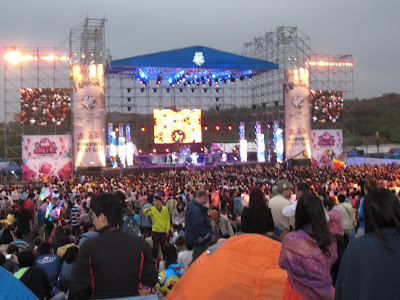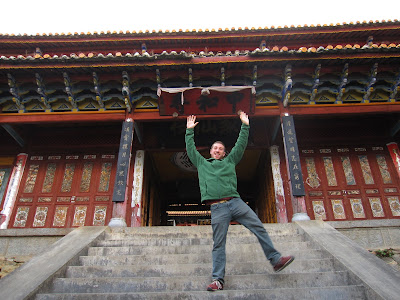Then I flew to Guangzhou and hopped on a train directly to Hong Kong. It's amazing that from mainland China you can take a train or a subway ride to Hong Kong, yet Hong Kong is distinctly not China. I only spent two nights and one full day, so I can only give a 40-hr visit impression. The pace and expectations for daily life felt very different. No one seemed interested to engage in the cultural dialogue I meet every day living in China.
When I walk around the streets in Kunming or in other places I have visited in China, I am definitely living abroad. I've become accustomed to a certain portion of the Kunming city routine, but most times I am a waiguoren, a foreigner. This status is tricky business; it's easy to stay wrapped up in a foreign bubble of other expats and cafes. On the other hand, you can learn to be a 中国通, a China hand or someone who knows how to connect with Chinese people and understands the customs and culture. I am somewhere in between, though I strive for the latter. However, Hong Kong seemed disinterested- people were distracted by fancy electronics and endless high-end shopping. Everyone spoke to me in English. Maybe that's how New York City appears to visitors but I missed the inevitable cultural interactions that make life in China a daily learning experience.
Besides the lack of interpersonal bonding, I enjoyed my stay in Hong Kong. In the morning, I took the ferry to Lantau Island. Hong Kong's location is special because of it's proximity to beautiful islands and apparently in the New Territory area of the city, one can escape city life entirely and get lost in nature. Lantau Island, did indeed feel like another world. I rented a bike and explored the beaches and inland forest-like landscape. I ate a snack sitting on the rocks between a waterfall. Then I took a speed ferry back and walked around Kowloon, an area closer to mainland China just north of Hong Kong Island. Finally I ended the day by taking a tram up to a high peak in Central, the downtown area of Hong Kong. Although it was foggy and getting dark out, I looked down on a 360 degree view of this booming bustling city. Fortunately, I had a friend to stay with and although he was busy at work, at night we walked on the longest covered outdoor escalator and ate yummy food.
I left Hong Kong by subway to Shenzhen, then took an hour train ride to Guangzhou. I just had the afternoon, by the time I arrived, so I walked around a local park and neighborhood area. Guangzhou is a more industrial city than Kunming and Chengdu, but it felt nice to be back in China.




























